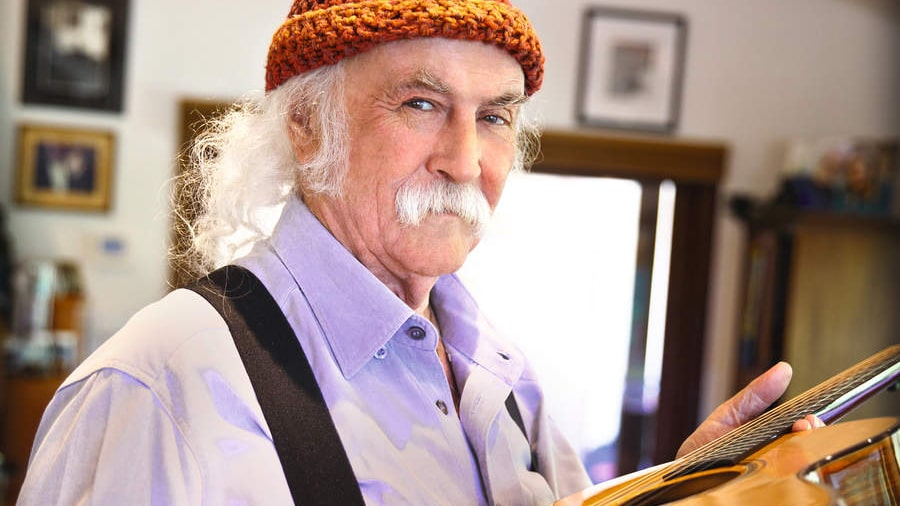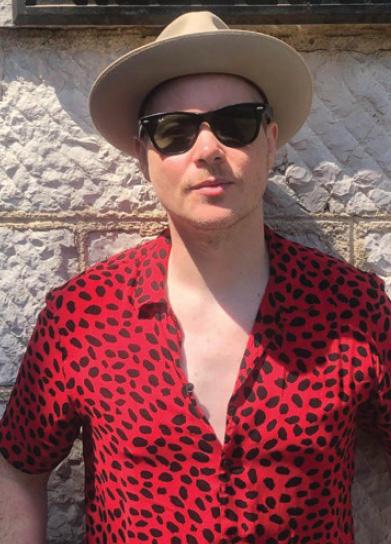Famed and celebrated for the timeless songs he created while a member of The Byrds and Crosby, Stills and Nash (and Young), David Crosby has also enjoyed a solo career that, having started relatively slowly, producing four albums in 43 years, since 2014 has seen a creative renaissance, ensuring that his name is independently synonymous with pure, emotive songs full of rich harmonies.
Five acclaimed albums followed over the next eight years. At the core of 2014’s Croz, 2017’s Sky Trails and last year’s For Free were Crosby and his son James Raymond, while 2016’s Lighthouse, and 2018’s Here If You Listen were made in collaboration with the Lighthouse Band, the collective name for his collaborations with singer/songwriters Becca Stevens, Michelle Willis, and Michael League, the multi-instrumentalist band leader of eclectic jazz outfit Snarky Puppy.
Live At The Capitol Theatre, recorded with the Lighthouse Band in 2018 and comprised of songs old and new delivered – and received – gloriously, is Crosby’s first ever solo live album and DVD. We caught up with the irrepressible Croz to talk about that and his continuing musical odyssey.

Releasing as much music as you have done recently suggests that it is, for you, more than just making a living.
It’s not making a living. I have money. It’s been a desire to make all the possible music that I can in this little space where I still can make music. I’m a human being; we peter out somewhere after eighty years old, and I’m eighty-one... It’s the one contribution I can make. The one place I can make anything better is to make all the music that I possibly can.
I’m really happy about the live album, because I think it’s an exceptional chemistry, and it’s a very honest record. We didn’t hide any flaws, we didn’t fix anything; that’s really us.
Was not wanting to peter out what inspired this creative streak, or was it already happening and you wanted to run with it?
What inspired it was me quitting CSN. When I quit CSN and did Croz, that was the point at which I just hit a real streak. I’d been holding back somewhat and I wasn’t happy with my situation, wasn’t happy with the chemistry, and just didn’t feel like doing my best work. And all of a sudden I had a clear path and I just really ran with it. I have been having a wonderful time.
One of the main reasons for the flurry of records is having two bands, one band being the Lighthouse Band. The four of us have a chemistry that was explosive to me, and I have been nursing it...
We have another [album] in the can waiting to drop. When we get on stage it’s a very honest relationship; we’re not trying to do showbiz, we’re trying to make the best music we possibly can. And people like it, you can tell it. And it feels good.
What do you think is the secret behind that chemistry?
I don’t know, man. It has to do, of course, with their proficiency at their vocals and playing. But the way that human beings meld together to make a creative process in the rare times that it happens, there’s so many variables that I doubt that anybody’s ever going to be able to chart it out scientifically. I can’t, and I do it. It is what I do.
I can’t really even describe the process to you, but there is a chemistry, and it happens between certain people – Becker and Fagen, Lennon and McCartney. Some people work together and it’s explosive.
A song you played that night at the Capitol Theatre was 1974, which the band reworked from a demo you made forty years ago. Why had it lain dormant for so long?
It’s just one of those scraps of melding harmony stuff that... You know, you don’t want to waste stuff, so you save it. Michael ran into that one and said: “Man, come on, let’s put words to this. This is a really nice set of changes.” And so we did.
After the fourth song, Vagrants Of Venice, you tell the audience: “This could possibly turn into a really good night.” Why did that night feel so special?
It was the last night of a tour. We had polished ourselves up pretty well, and we felt good, man. It’s always a feeling thing. You know, you can do everything by the book, correct and perfect, and it doesn’t work at all, and sometimes everything is wrong and it works great anyway. There’s a feel thing to it, and I can’t explain it, but this was one of those nights. We knew it, we felt it - you can see it in our faces.
The show ended with a sparkling rendition of Woodstock, a song of hope and possibility, and feels like a very auspicious end to proceedings.
Yeah. I thought it was free of most precepts, most normal restrictions in people’s thinking. It was a pretty wide spectrum – we come from folk and jazz and pop, and we are very different people from different generations and different countries – but what happens is very human. It’s very good. And the audience was very sophisticated and really into it, and wasn’t looking for hits, and they were into what we were doing. And that was a complete joy to us.
‘Hope’ and ‘possibility’ are also two words that come to mind when considering recent footage of Woodstock’s writer, your friend Joni Mitchell, whose recuperations have enabled her to return to the stage recently. How did you feel seeing that?
I think she’s wonderful. I think she’s the best singer-songwriter of our times, and every bit of ground that she can recover is a joy to me. Wasn’t that Brandi Carlisle that did that with her? Man, she deserves a lot of credit. That was a wonderful thing to do. She coaxed Joni into that, and she masterminded that whole thing, and I’m gonna find her and say thank you to her, because I just love her for doing that.
How do you feel when you sing your songs to people?
I feel completion. I feel like I’m doing my life’s work. I was given the ability to do it, and I feel blessed, so I feel like I’m complete. When I sing a song well and I can take people on a little voyage some place – ‘Come on, let me tell you this story’ – I feel complete. I feel good. I feel whole. I feel like I’m doing my life’s work.
The album and DVD Live At The Capitol Theatre by David Crosby & The Lighthouse Band is out now via BMG.

